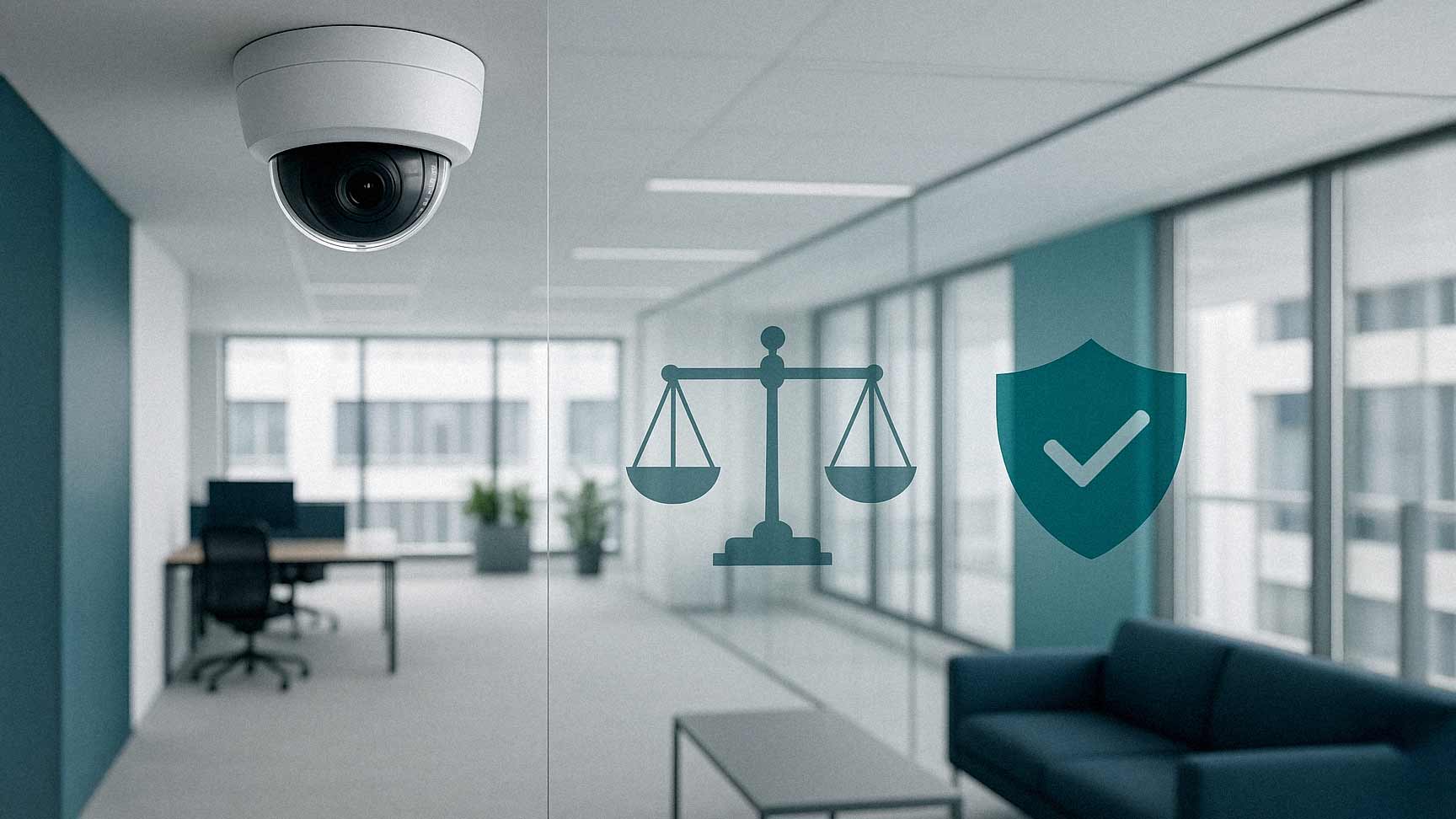How Privacy Laws Affect Your Business Security Camera Setup
July 24th, 2025 | 6 min. read

Security cameras are one of the smartest investments a business can make. They deter crime, protect employees, reduce liability, and provide peace of mind.
But if you install them without understanding the law, you could end up in legal trouble instead of avoiding it.
Most business owners assume that if they own the property, they can install cameras wherever they want. Unfortunately, that is not true.
Federal and state privacy laws impose clear limits on where and how you can record individuals, particularly in the workplace.
In this article, we will explain what privacy laws say about the use of security cameras, where you can and cannot install them, what risks to avoid, and how to stay compliant so your business is protected both legally and physically.
Why Security Camera Laws Matter to Small Businesses
Unfortunately, you cannot just put cameras anywhere you want.
Even though you own or lease the space, there are restrictions on where surveillance is allowed. People still have a right to a reasonable expectation of privacy. Recording someone without their knowledge or consent in certain places could violate state or federal laws.
This includes areas such as restrooms, locker rooms, and some break rooms. Even recording employees at their desks may raise concerns if not handled properly.
Legal Consequences of Improper Setup
If your cameras are installed in a way that violates privacy laws, you could face:
- Fines or legal penalties
- Civil lawsuits from employees or customers
- Loss of footage as admissible evidence
You may also be required to remove the cameras and compensate for any damages. And if you used the footage for disciplinary or legal purposes, it may not hold up in court if it was gathered unlawfully.
Protecting Your Business From Lawsuits and Complaints
The goal of installing cameras is to reduce risk, not create new ones. Taking time to understand the legal side ensures you protect your assets without crossing a line.
It also builds trust with employees and customers by demonstrating respect for their privacy while ensuring security.
What Areas Can and Cannot Be Legally Recorded?
Generally, you are permitted to install cameras in public or shared areas of your workplace. This includes:
- Lobbies
- Hallways
- Entryways
- Warehouses
- Parking lots
- Cash registers
- Shared office space
However, you cannot record in areas where people reasonably expect to be private. These include:
- Bathrooms
- Changing rooms
- Medical rooms
- Personal offices, in some cases
- Employee breakrooms, depending on state law
If you are unsure whether an area is private or public, it is safer to assume that it may require special rules or consent.
Common Off-limits Areas
The most common mistakes businesses make involve installing cameras in:
- Restrooms or near restroom entrances
- Locker rooms or areas where employees change clothes
- Office kitchens or lounges where employees relax
- Anywhere employees could argue they are being monitored inappropriately.
These areas should be avoided unless you have precise legal guidance to do otherwise.
Can You Record Audio as Well as Video?
Audio recording is a much more sensitive topic than video. In many states, recording someone’s voice without their consent is illegal, even if they are on your property.
If your camera system includes microphones, be extremely careful. Some states require both parties to a conversation to consent to being recorded.
This is known as two-party consent, and violating it can result in serious legal consequences.
Federal and State Laws You Should Know About
At the federal level, the Wiretap Act prohibits recording audio without the consent of at least one party. However, state laws can be stricter. Some states require all parties involved in a conversation to consent.
This is especially important if your cameras include audio recording. Always check your state’s wiretap laws before enabling audio.
State-specific Video Surveillance Laws
Each state has its own rules about video surveillance. For example:
- California and Florida require signs if surveillance is being used
- Connecticut requires employers to notify employees before implementing video monitoring.
- Illinois has strict laws regarding the collection of biometric data.
You must follow the laws of the state where the recording takes place. If you have offices in multiple states, each one may have different rules.
Rules for Employee Notification and Consent
In most states, it is legal to monitor employees in public areas, provided that you notify them. Posting signage or including video monitoring language in your employee handbook is usually enough.
However, some states may require written consent or more formal notice. If you are unsure, consult with a legal or HR professional before proceeding.
Laws about Camera Placement Facing Public streets or neighboring properties
You are generally allowed to place cameras that capture public areas, such as sidewalks or parking lots. However, pointing a camera at a neighboring business or residential property can create legal and privacy concerns.
Ensure your cameras are focused only on areas where you have the right to monitor. Avoid capturing footage from windows, yards, or other spaces that do not belong to you.
What Happens If You Don’t Comply?
If you install cameras without proper authorization, your business may be fined or sued. You might also lose the right to use your footage in court or during an internal investigation.
That means if someone steals from you and your footage was captured improperly, it could be thrown out, leaving you with no legal protection.
Employee Pushback or HR Complaints
Employees may feel uncomfortable or violated if cameras are installed without proper notice or placed in questionable locations. This can lead to HR complaints, lowered morale, and even legal action depending on the circumstances.
It is not worth the risk. Transparency and respect go a long way.
Damage to Your Brand and Customer Trust
If word gets out that your business is recording people inappropriately, it can hurt your reputation. Customers may be less willing to engage with your company, and employees may question your leadership or company culture.
Security is essential, but it should never come at the cost of trust.
How Do I Stay Compliant When Installing Security Cameras?
A professional installer understands both the technical and legal requirements of proper camera placement. They will help you avoid obvious mistakes and ensure your system is effective without being invasive.
If you are in Nevada or Southern California, AIS can help design a compliant, custom system for your space.
Post Signs and Notify Employees or Customers
Let people know they are being recorded. This is often as simple as posting signs at entry points or adding a clause to employee documentation.
Clear communication helps avoid confusion, complaints, and potential legal issues.
Review Local and State Laws Before Installation
Each state has unique privacy rules. Do not assume that what works in one location will apply everywhere. Take the time to read up on your area’s laws or talk to an attorney if needed.
This is especially important if you are planning to record audio or install cameras in employee areas.
Avoid Audio Recording Unless You Are Certain It Is Legal
If you are unsure whether you can record audio, play it safe and disable that feature. It is better to have clear, silent footage than to risk violating privacy laws.
In many cases, video alone is enough to provide the protection and visibility you need.
Secure Your Footage to Meet Data Privacy Standards
Even if your cameras are installed correctly, you must protect the recordings. Use password-protected systems, limit access to authorized personnel, and make sure footage is stored securely.
If your business is subject to HIPAA, PCI, or other compliance standards, discuss with your IT provider how camera footage fits into your broader data security plan.
Final Thoughts: Smart Security Starts with Smart Compliance
Security cameras can help protect your business, your employees, and your customers. But only if you use them responsibly and legally.
Here is what to remember:
- Know what areas you can and cannot record
- Avoid audio recording unless your state law allows it.
- Always notify employees and customers when cameras are in use.
- Use a trusted installer who understands legal and technical requirements.
- Protect your footage just like you protect other business data.
The best security system is the one that works well and keeps you out of trouble. Get it right from the start, and you will enjoy all the benefits without the legal risks.
Need help designing a compliant security camera system?
AIS can help you choose the right equipment, ensure proper placement, and keep your business protected.
A true southerner from Atlanta, Georgia, Marissa has always had a strong passion for writing and storytelling. She moved out west in 2018 where she became an expert on all things business technology-related as the Content Producer at AIS. Coupled with her knowledge of SEO best practices, she's been integral in catapulting AIS to the digital forefront of the industry. In her free time, she enjoys sipping wine and hanging out with her rescue-dog, WIllow. Basically, she loves wine and dogs, but not whiny dogs.
Topics:



